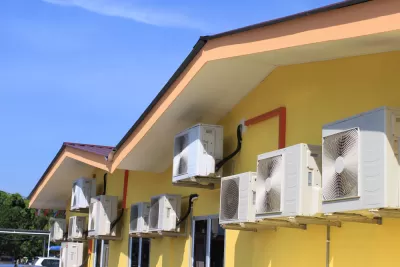An analysis of trends in energy-efficiency improvements reveals the success of policies enacted during the previous decades.

"Compared to 2009, single-family homes built before 1980 are now better insulated, have relatively newer heating equipment, and are more likely to have undergone an energy audit," according to an article by Elizabeth La Jeunesse.
"Homeowners' annual spending for related projects—including roofing, siding, windows/doors, insulation and HVAC—expanded from $50 billion to nearly $70 billion over 2009-2015," adds La Jeunesse.
La Jeunesse is sharing the results of Harvard Center for Joint Housing Studies analysis of the U.S. Energy Information Administration's Residential Energy Consumption Survey (RECS). The article credits the improvement of energy efficiency in the nation's older housing stock to incentives put in place when energy prices spike in the mid-2000s. At the federal level, La Jeunesse, credits the Obama Administration's American Recovery and Reinvestment Act of 2009, "which extended and strengthened tax credits for energy improvements to existing homes, including insulation, windows, roofs, water heaters, furnaces, boilers, heat pumps, and central air conditioners."
Energy prices have dropped enough since then, however, that the article includes a warning about a relative lack of incentives for energy-efficiency improvements.
FULL STORY: Significant Improvements in Energy Efficiency Characteristics of the US Housing Stock

Maui's Vacation Rental Debate Turns Ugly
Verbal attacks, misinformation campaigns and fistfights plague a high-stakes debate to convert thousands of vacation rentals into long-term housing.

Planetizen Federal Action Tracker
A weekly monitor of how Trump’s orders and actions are impacting planners and planning in America.

Chicago’s Ghost Rails
Just beneath the surface of the modern city lie the remnants of its expansive early 20th-century streetcar system.

Bend, Oregon Zoning Reforms Prioritize Small-Scale Housing
The city altered its zoning code to allow multi-family housing and eliminated parking mandates citywide.

Amtrak Cutting Jobs, Funding to High-Speed Rail
The agency plans to cut 10 percent of its workforce and has confirmed it will not fund new high-speed rail projects.

LA Denies Basic Services to Unhoused Residents
The city has repeatedly failed to respond to requests for trash pickup at encampment sites, and eliminated a program that provided mobile showers and toilets.
Urban Design for Planners 1: Software Tools
This six-course series explores essential urban design concepts using open source software and equips planners with the tools they need to participate fully in the urban design process.
Planning for Universal Design
Learn the tools for implementing Universal Design in planning regulations.
planning NEXT
Appalachian Highlands Housing Partners
Mpact (founded as Rail~Volution)
City of Camden Redevelopment Agency
City of Astoria
City of Portland
City of Laramie




























